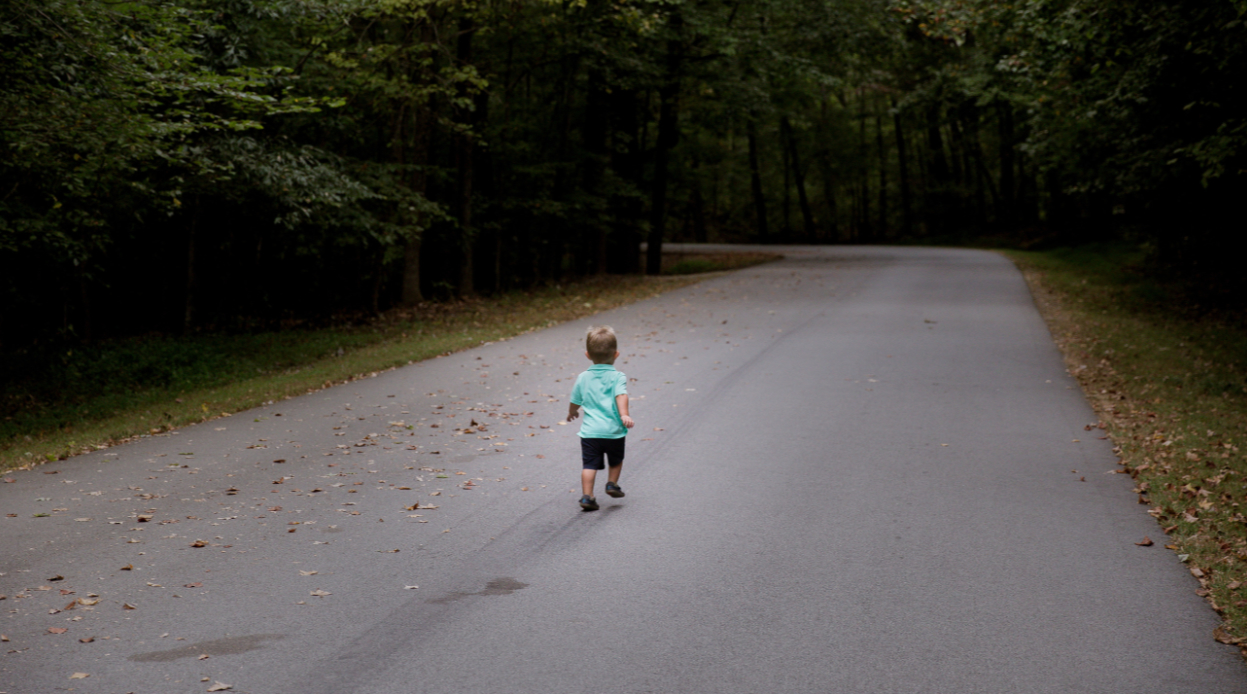“I was very thankful to the stranger who swiftly yanked me back out of the path of a fast-moving vehicle when I absentmindedly started walking into the road.”
– Sarah Fitz-Claridge
And now for my answer to the classic What if… ? question about what parents taking their children seriously do if their child seems to be about to have an altogether too-close encounter with an oncoming articulated lorry:
“What if your child runs into traffic?”
The answer to that question is the same as the answer to the question: “What if your partner runs into traffic?” or “If you and a friend were walking along a busy road and you ran into (or, one hopes, were about to run into!) the path of an oncoming truck, what would you want your friend to do?”
If I were the one about to run into traffic, I would want my friend to grab me back, out of the path of the oncoming articulated lorry, to save my life. Isn’t that what everyone would want? Or at least, is that not a reasonable assumption to make in such a life-and-death situation? I was very thankful to the stranger who swiftly yanked me back out of the path of a fast-moving vehicle when I absentmindedly started walking into the road.
When there really is no time to ask the person if they want their life saved, we save their life, obviously!
In the highly unlikely event that the person whose life you have just saved says to you, “Hey, I was trying to commit suicide! Why did you save my life without checking with me that that was what I wanted?” I would be wondering why the person had not thought to mention that intention earlier in our walk. And if the person really does want to commit suicide, well, there is no shortage of articulated lorries—not to mention bridges, tall buildings and fentanyl.1 😳
“I thought you claim to be against coercion, but evidently you are just as willing to coerce when necessary as the rest of us!”
Saving our child’s life in such a situation is no more likely to be coercive than it would be for our own life to be saved. The idea that an action is necessarily coercive unless you have a conversation about it first is a mistake. Most non-coercive problem solving does not involve any discussion: we have and act on quite reasonable conjectures about what our loved ones will want in such circumstances. If we are having a nice chat, walking along a road, and our child or other loved one suddenly makes a dash into the street, it really does not need a discussion—it seems clear that our loved one is risking their life by mistake, not intentionally.
If, given the life-and-death situation, we yank the child back so powerfully that they are, in that moment, shocked and upset, then yes, that might be coercion. Sometimes, in such situations, we might fail to create the necessary knowledge to save their life without coercion in real time in the moment. We are fallible and not omniscient. Sometimes we make a mistake. It does not follow that there was no possible way of saving their life that would not have been coercive. Problems are soluble. But even if there might be a moment of upset, just as there might be for any of us if suddenly yanked backwards, once the person realises what just happened (that you have just saved their life), what they are going to be feeling is relief, not thwarted.
Moreover, notice that if a moment of upset occurs as a result of us trying to save the life of someone not suicidal, that is nothing like the intentional coercion paternalistic parents engage in.
In the life-saving case we are discussing, the coercion is unintentional and just an innocent mistake, not a matter of the parent trying to thwart the child. The parent is taking the life-saving action thinking that that is what the child would want, just like they would with an adult friend.
In the intentional coercion case, parents are making the effort to apply their creativity and ingenuity intentionally to compel the child—to double-bind the child such that the child obeys (now euphemistically referred to as ‘cooperating’). They are coercing because they think it is for the child’s own good, rather than because they think the child would want them to do what they are doing. They would not do the same with their adult friends because they do not view their adult friends through the lens of paternalism like they do their child.
Notes
1. Much as I choose life and detest death and would do everything in my power to persuade a suicidal person not to kill themselves, ultimately people do have a right to end their life if they want to. It is a total tragedy if they do, and I wish everyone who is feeling suicidal could see a psychiatrist like Michael Golding, who could so easily have them feeling better in a very short time—no one has to feel so bad they want to end their life—you can feel better, and when you feel better, you can then be solving your problems. It breaks my heart that so many people suffer terrible depression and suicidal feelings and have no idea that such feelings are totally treatable using psychiatric medications.
See also:
- “If coercion has impaired my ability to correct errors, is taking children seriously even possible?”
- Coercion impairs children’s ability to reason
- It’s your house, your income, your everything; and if the kids don’t like it…
Sarah Fitz-Claridge, 2022, Taking Children Seriously FAQ: ‘“What if your child runs into traffic?”’, https://takingchildrenseriously.com/what-if-your-child-runs-into-traffic/
